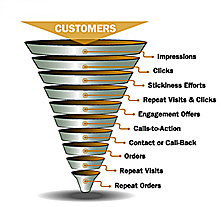Think of this as Volume 18, Number 14 of the newsletter I have written weekly since March, 1997. Enjoy.

I call it the “run of network trap.” Sites that depend on advertising are going for raw page views, offering clickbait and other types of journalistic fast food, rather than anything resembling insight or enterprise.
I've played this game myself, at Seeking Alpha.
I wrote lots of stories there about Google, or Apple, or Microsoft, because I knew that they would draw clicks and I was getting paid one cent per page view. It worked. I made money. The site made money.

The site's owners have tried to reverse course. They're offering premium prices for better stories. They're putting in more disclosure on their writers. And they're creating more paid tiers to make money from this higher-priced content.

You can see the results on Google News. Just click around. Unless you're a paying customer you mainly see headlines. Or opinion pieces – the more outrageous the better. Everything else is behind a paywall – readers are losing access to stories. Even many sites that just post press releases are demanding you register before you can look at them.
The solution is for publishers to go back to the future. Stop focusing on gross numbers. Stop worrying about how many readers you have. Start focusing on having the right readers.
This starts with having a registration database which answers the questions your market wants to know. And that means having incentives in place for people to register. Like a full-text RSS feed. Like a mailing list offering relevant information that is easy for you to collect, like coming events your readers will care about.

Newspapers could prove to car dealers that of the X number of people driving past their stores each day, Y% took the newspaper. Magazines could show that of the X number of decision makers in the business Y% took the magazine – they would have names, titles, addresses. Filling out the “qual card” got you the publication for free, while others had to pay for it. And the more important readers got copies without even sending in the qualcard. Consumer publications could survey their readership and prove to people selling to that lifestyle that X percent of their market, with Y amount of buyign power, subscribed to the publication.
It's time to go back to the future.
The counter argument, the assumption that all this is hopeless, is easy enough to make. Google has great tools with which you can slice-and-dice audiences and pretend to get just the readers you want for the price of run of network. You can buy just Atlanta, for instance, or a collection of sites on a specific topic, and pay the run of network price, which won't justify the expense of creating the content.
So what sites need to do is highlight the advertisers who are exclusive to them. Give them the best placement. Mention their names to your readers. Tell your readers that these people support the work you are doing for them.

Run of network can't assure that. Pocket the dollars from run of network advertising, but treat it as pure profit. The business needs to run on the relationships you develop between buyers and sellers.
When someone in, say, Decatur Georgia, is reading content on a Decatur Georgia web site, they're thinking about Decatur Georgia. When an investor is reading TheStreet.com, they're thinking about investment. When someone in advertising is reading AdAge, they're thinking about advertising. And this mental attitude is important – it's more likely to lead to buying than any other mental attitude.
So your job is to know the names of these people, on both sides of the transaction. Know their addresses, know how much they spend within your target market. Prove to your market that you can get them their buyers, and you don't just sell advertising – you build relationships.
The problem with journalism, at all levels, is that it's being led online by journalists. It needs to be led by publishers. And it needs to be led by publishers who are devoted to the place, industry or lifestyle they're covering, by businessmen who love and identify with their markets.

This has always been the case. The problem is that, with the rise of the Web, publishers forgot this and put the journalists in charge. No offense to my fellow journalists, but we're dancing bears, we're entertainers. We're entertained by the work we do, and we do it for reasons other than making money. That makes us cheaper than hard-headed business types, but it also makes us worthless in running businesses.
Publishers need to know who their best readers are. They need to make certain their best readers represent the whole of the market they're trying to reach. They need to value their target market and give the rest away to advertisers. They need to be able to prove, to their trusted business partners, that they are hitting the target, that buying your publication is the market participant's best choice, indeed their only choice.
You can sell run of network, just don't focus on it. Focus on proving to sellers that you have their buyers, and to buyers that you have the products and sellers they want. Get to know these people by name, so you can point them out to one another whenever you want, whenever they need. This justifies a premium CP/M, which is what separates real journalism from crap.
A premium ad rate, based on hard data, backed by a registration database and a personal e-mail relationship with both sides of a transaction, is what makes journalism work. All the rest, including everything I've done throughout my entire career in the field, is the show.









